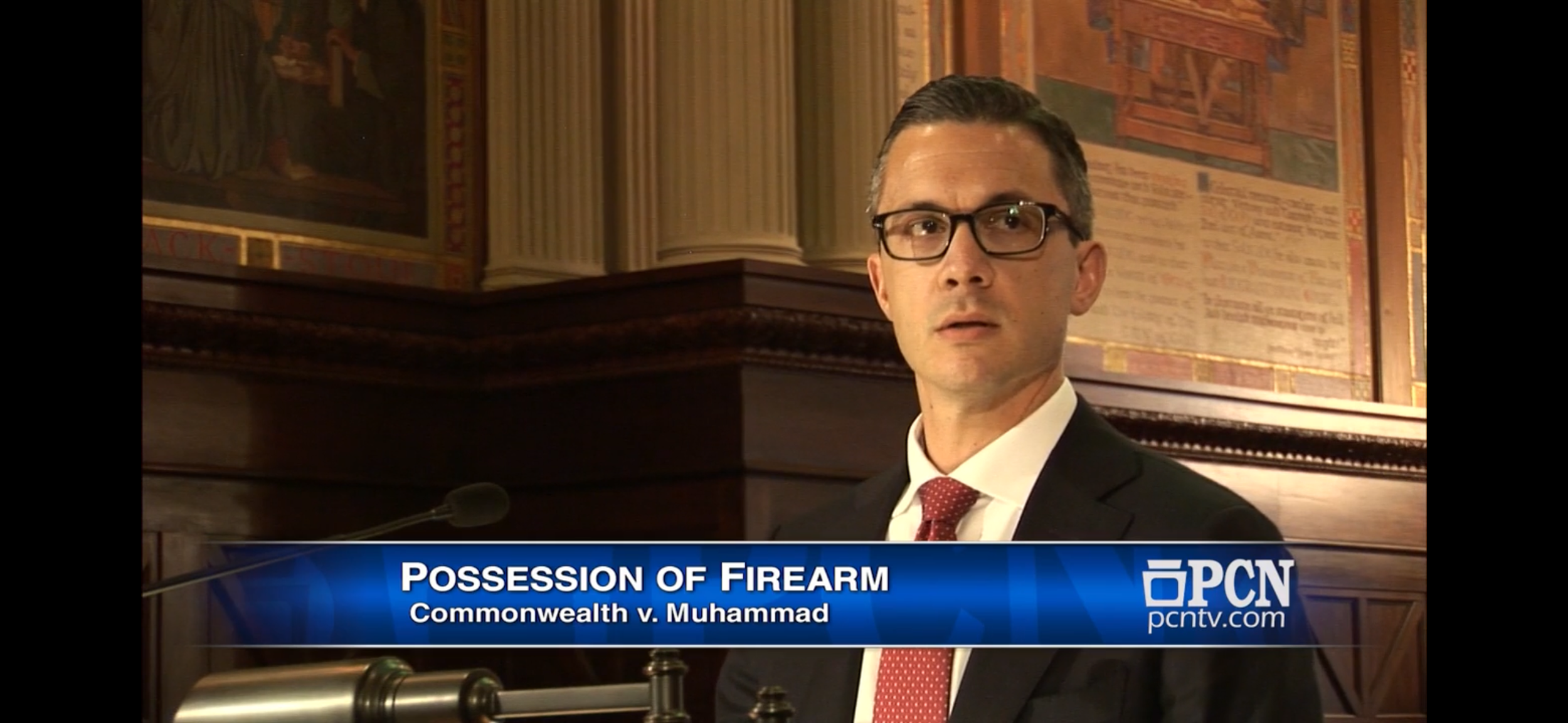
Philadelphia Criminal Defense Blog
Pennsylvania Superior Court Affirms Suppression of Cell Phone Evidence in Drug Case Because Police Looked at Phone Screen Without Warrant
Philadelphia Criminal Defense Lawyer Zak T. Goldstein, Esquire
The Pennsylvania Superior Court has decided the case of Commonwealth v. Carter, holding that the trial court properly suppressed a cell phone where the police looked at the cell phone’s screen during the execution of a search warrant for drugs without getting a warrant to look at the cell phone itself.
The Facts of the Case
The defendant was under investigation by the Lycoming County Narcotics Enforcement Unit (“LCNEU”) for alleged crack cocaine sales. The officers allegedly conducted several controlled buys in June, July, and November 2023. The controlled buys involved using confidential informants to purchase drugs near the defendant’s residence in Williamsport, PA. Based on the information obtained from these controlled buys, the officers obtained search warrants for his home.
During the execution of one of the search warrants, the officers claimed that they saw the defendant’s cell phone screen light up. It apparently displayed a partial text message from a woman allegedly involved in some of the drug deals. An officer photographed the message and later used it to obtain another warrant to seize and search the phone itself. The initial warrant did not authorize searching or seizing the phone. The defendant was then charged with drug delivery offenses such as possession with the intent to deliver.
The Motion to Suppress
The defense attorney filed a motion to suppress the cell phone evidence, arguing that police conducted an unlawful search by looking at and photographing the phone’s screen without first obtaining a search warrant. The trial court agreed, finding that even a “small” intrusion into a cell phone, such as reading a text message notification, counts as a search under both Pennsylvania and U.S. Supreme Court law.
The court also doubted the police explanation, suggesting that the officers were not totally credible. The court was skeptical that the phone screen “lit up on its own” to reveal a six-hour-old message, concluding it was more likely that officers manipulated the phone given the age of the message. Because the phone evidence was unlawfully obtained in that police likely manipulated the phone before obtaining a warrant, the court ruled that the evidence from the phone was “fruit of the poisonous tree” and had to be suppressed. The Commonwealth appealed.
The Superior Court’s Ruling
On appeal, the Commonwealth argued that simply observing the phone screen fell within the “plain view” exception to the warrant requirement. The police had the right to be in the house based on the first warrant, so there was no reason they could not look at the phone given that the phone was in plain view. The Superior Court rejected this argument. Relying on Riley v. California and Commonwealth v. Fulton, the court reaffirmed that cell phones are constitutionally protected spaces. Even minimal intrusions, like reading a text message, require a warrant.
The Superior Court also concluded that the trial court acted within its authority to question the credibility of the assertions contained in the affidavit and concluded that the “plain view” doctrine did not apply. As a result, the Court affirmed the suppression of the defendant’s phone and all evidence derived from it.
The Takeaway
This decision highlights how strongly Pennsylvania courts protect privacy interests in cell phones. Police cannot sidestep the warrant requirement by claiming that a text message or notification appeared in plain view. If officers want to read or use information from a phone, they must get a warrant.
For defendants, this ruling is a reminder that evidence obtained through unconstitutional searches may be excluded, which may significantly weaken the prosecution’s case. For anyone facing drug charges in Pennsylvania, especially cases involving phones, texts, or social media, it is critical to have a defense lawyer who understands the latest case law and knows how to fight unlawful searches.
Facing criminal charges or appealing a criminal case in Pennsylvania?
Goldstein Mehta LLC Defense Attorneys
If you are facing criminal charges or under investigation by the police, we can help. We have successfully defended thousands of clients against criminal charges in courts throughout Pennsylvania and New Jersey. We have successfully obtained full acquittals and dismissals in cases involving charges such as Conspiracy, Aggravated Assault, Rape, Violations of the Uniform Firearms Act, and First-Degree Murder. We have also won criminal appeals and PCRAs in state and federal court, including the successful direct appeal of a first-degree murder conviction and the exoneration of a client who spent 33 years in prison for a murder he did not commit. Our award-winning Philadelphia criminal defense lawyers offer a free criminal defense strategy session to any potential client. Call 267-225-2545 to speak with an experienced and understanding defense attorney today.
PA Superior Court: A Defendant Can Conspire to Commit Second-Degree Murder
Philadelphia Criminal Defense Lawyer Zak T. Goldstein, Esquire
The Pennsylvania Superior Court has decided the case of Commonwealth v. Wellman, holding that conspiracy to commit second-degree murder is a cognizable offense under Pennsylvania law. The Court held both that the offense exists in Pennsylvania and that the evidence was sufficient to uphold the defendant’s conviction.
The Facts of Wellman
The case arose out of a violent robbery which occurred on October 5, 2019, in Philadelphia. The Commonwealth alleged that the defendant and his brother entered an apartment, brandishing a handgun and what appeared to be a rifle. They robbed several occupants of their wallets, phones, and valuables. When the decedent resisted, the defendant pressed a handgun to the decedent’s head and fatally shot him. Police later apprehended the brothers in a nearby alley. The police recovered stolen items, discarded clothing, and a revolver with gunshot residue in it.
The police arrested the defendant, and prosecutors charged him with second-degree murder, robbery, conspiracy, and firearms offenses. He went to trial, and the jury found him guilty. He received a mandatory life-without-parole sentence for the murder, as well as a consecutive five-to-ten year sentence for robbery.
The Superior Court Appeal
On appeal, the defendant’s attorney initially filed an Anders brief, which is a brief indicating that the attorney did not think the defendant had a single viable appeal issue. These should almost never be filed following a trial, especially in a murder case. Accordingly, the Superior Court rejected the Anders brief and directed the attorney to file a new brief for the appeal. The Superior Court had identified a potentially non-frivolous issue: whether the evidence was sufficient to convict the defendant of conspiracy to commit second-degree murder. In a new brief, the defendant argued that he and his brother only agreed to commit a robbery, not murder. The Commonwealth actually went further and argued in its brief that conspiracy to commit second-degree murder is not even a cognizable crime, meaning it does not exist. The Commonwealth did not move to vacate the substantive murder conviction, but it did argue that the Court should vacate the conspiracy conviction.
The Superior Court’s Ruling
The Superior Court rejected both positions:
Sufficiency of the Evidence: The Court held that the robbery agreement, carried out with firearms and escalating violence, supported the inference that the brothers entered into a conspiracy that encompassed second-degree murder. Even without an express plan to kill, the inherently dangerous felony and Wellman’s use of a firearm made the risk of death foreseeable.
Cognizability of the Offense: Relying on the Pennsylvania Supreme Court’s decision in Commonwealth v. Fisher, 80 A.3d 1186 (Pa. 2013), the Court concluded that conspiracy to commit second-degree murder is a legally valid offense. Just as one can conspire to commit third-degree murder or involuntary manslaughter, one can conspire to commit felony murder by agreeing to engage in conduct that carries a wanton disregard for life.
The Court therefore affirmed Wellman’s life sentence and rejected the Commonwealth’s somewhat unexpected argument to vacate the conviction.
Takeaway
This decision settles an open question in Pennsylvania law: conspiracy to commit second-degree murder is a cognizable offense. Defendants charged under this theory cannot avoid liability by arguing that felony murder is “unintentional.” If conspirators agree to commit a dangerous felony like armed robbery, they may be held liable not just for the robbery, but also for any resulting deaths. This is true even where no specific intent to kill is proven.
Facing criminal charges or appealing a criminal case in Pennsylvania?
Goldstein Mehta LLC Defense Attorneys
If you are facing criminal charges or under investigation by the police, we can help. We have successfully defended thousands of clients against criminal charges in courts throughout Pennsylvania and New Jersey. We have successfully obtained full acquittals and dismissals in cases involving charges such as Conspiracy, Aggravated Assault, Rape, Violations of the Uniform Firearms Act, and First-Degree Murder. We have also won criminal appeals and PCRAs in state and federal court, including the successful direct appeal of a first-degree murder conviction and the exoneration of a client who spent 33 years in prison for a murder he did not commit. Our award-winning Philadelphia criminal defense lawyers offer a free criminal defense strategy session to any potential client. Call 267-225-2545 to speak with an experienced and understanding defense attorney today.
Pennsylvania Superior Court Rules Non-Violent Felon Gun Ban Constitutional in Commonwealth v. Randolph
Philadelphia Criminal Defense Lawyer Zak T. Goldstein, Esquire
On July 31, 2025, the Pennsylvania Superior Court issued a new decision in Commonwealth v. Randolph, upholding the constitutionality of Pennsylvania’s felon-in-possession statute, 18 Pa.C.S. § 6105(a)(1). The Court rejected Randolph’s Second Amendment challenge to the law, finding that individuals with felony drug convictions such as PWID (Possession With Intent to Deliver) can still be lawfully prohibited from owning or carrying firearms even though PWID is generally a non-violent offense.
This ruling adds to the growing body of appellate decisions in Pennsylvania that interpret how the U.S. Supreme Court’s landmark gun rights cases (Bruen, Heller, and Rahimi) apply to state gun control laws. If you or a loved one are facing a charge under § 6105 or any other firearm offense in Pennsylvania, it is important to understand the implications of this ruling and how it might affect your defense. Additionally, the Superior Court may not have the last word on the constitutionality of these statutes as the PA Supreme Court has granted review in a number of these cases.
The Facts of Commonwealth v. Randolph?
The defendant was convicted in Allegheny County of two firearm charges:
Persons Not to Possess a Firearm under 18 Pa.C.S. § 6105(a)(1), and
Carrying a Firearm Without a License under 18 Pa.C.S. § 6106(a).
The charges stemmed from an incident in which the defendant was seen with a handgun inside a bar. At the time, he was prohibited from possessing firearms due to prior felony drug convictions. specifically, he had two 2005 convictions for PWID.
The defendant filed a motion to dismiss the § 6105 charge, arguing that the statute violated his Second Amendment rights, both facially and as applied to him. The trial court denied the motion, and the jury convicted him on all counts. The defendant was sentenced to four to eight years in state prison and appealed.
The Constitutional Challenge: Can Nonviolent Felons Possess Guns?
On appeal, the defendant argued that § 6105 is unconstitutional in light of New York State Rifle & Pistol Association v. Bruen, in which the U.S. Supreme Court emphasized that gun laws must be rooted in the nation’s historical tradition of firearm regulation. He also cited Range v. Attorney General, where the Third Circuit struck down the federal felon-in-possession statute as applied to a nonviolent offender convicted of food stamp fraud.
The defendant claimed that his prior convictions for nonviolent drug offenses should not disqualify him from owning a firearm and that the Commonwealth failed to prove a historical tradition of disarming people like him.
The Superior Court’s Decision
The Pennsylvania Superior Court rejected Randolph’s arguments and upheld his conviction. Applying the Bruen two-step test, the Court first held that Randolph was part of “the people” protected by the Second Amendment even as a convicted felon. However, the Court went on to conclude that Pennsylvania’s firearm ban for even non-violent felons is constitutional because:
There is a long-standing historical tradition of disarming individuals considered dangerous or a threat to public safety.
Drug trafficking is inherently dangerous and often associated with the use of firearms.
The statute does not impose a lifetime ban without recourse. Individuals convicted under § 6105 can, in some cases, petition the court for restoration of their firearm rights.
The Court emphasized that Bruen does not require a "historical twin" to justify modern firearm laws. Instead, it only requires a sufficiently analogous tradition. Citing colonial laws that disarmed vagrants, outlaws, and those deemed threats to public order, the Court found § 6105 to be consistent with that historical framework.
What This Means for People Facing Gun Charges in Pennsylvania
This case makes clear that Pennsylvania courts are continuing to uphold the constitutionality of § 6105 even after federal decisions such as Bruen, Rahimi, and Range. This is particularly true in cases involving felony convictions for drug offenses or violence. While there is ongoing litigation in both state and federal courts challenging the law (and defendants have done better in federal court than in state court), defendants with serious prior convictions may still be prohibited from possessing firearms under current Pennsylvania law. The Supreme Court has also granted review in at least two cases, and that litigation is still ongoing.
However, these constitutional issues are evolving, and every case is fact-specific. There are still strong constitutional arguments available in many cases, particularly where the prior conviction is nonviolent, less serious than PWID, and remote in time.
Facing criminal charges or appealing a criminal case in Pennsylvania?
Goldstein Mehta LLC Defense Attorneys
If you are facing criminal charges or under investigation by the police, we can help. We have successfully defended thousands of clients against criminal charges in courts throughout Pennsylvania and New Jersey. We have successfully obtained full acquittals and dismissals in cases involving charges such as Conspiracy, Aggravated Assault, Rape, Violations of the Uniform Firearms Act, and First-Degree Murder. We have also won criminal appeals and PCRAs in state and federal court, including the successful direct appeal of a first-degree murder conviction and the exoneration of a client who spent 33 years in prison for a murder he did not commit. Our award-winning Philadelphia criminal defense lawyers offer a free criminal defense strategy session to any potential client. Call 267-225-2545 to speak with an experienced and understanding defense attorney today.
Superior Court Reverses Denial of PCRA Relief for Attorney Goldstein’s Client in Internet Contraband Case
Philadelphia Criminal Defense Attorney Zak T. Goldstein, Esquire
Philadelphia criminal defense attorney Zak T. Goldstein, Esquire, recently won a significant victory for his client, M.D., in the Pennsylvania Superior Court. In a detailed, 18-page opinion issued in July 2025, the Superior Court reversed the PCRA court’s order dismissing M.D.’s Post Conviction Relief Act petition and remanded the case for further proceedings. The Court found that the PCRA court erred in concluding that trial counsel was effective despite trial counsel’s decision to repeatedly tell the jury that the client had asked to speak with a lawyer and declined to give a statement to the police when the police executed a search warrant at his house.
The client had been convicted following a second jury trial of possession and dissemination of child pornography and sentenced to five to ten years in state prison. His first trial ended in a mistrial after the first jury could not reach a unanimous verdict. The Superior Court denied his direct appeal, and the client filed a PCRA petition. The PCRA court appointed a different lawyer, who amended the petition, and the PCRA court denied that petition. The client then hired Attorney Goldstein for the appeal from the denial of the first PCRA petition.
On appeal, Attorney Zak Goldstein raised layered claims of ineffective assistance of counsel—arguing both that the client’s trial counsel mishandled crucial aspects of the defense and that PCRA counsel failed to raise those issues in the first petition. For example, PCRA counsel failed to argue that the trial attorney was ineffective for introducing evidence of her own client’s post-Miranda silence.
The Superior Court agreed and remanded the case for an evidentiary hearing before the trial judge, who also presided over the PCRA proceedings. The judge heard from the attorneys who represented the client at the second trial that ended in a conviction as well as the first PCRA lawyer and again denied the petition. Attorney Goldstein filed an appeal, and the Superior Court reversed yet again.
This time, the Superior Court held that trial counsel acted unreasonably and to her client’s detriment by repeatedly referencing the client’s post-Miranda silence during trial. Although trial counsel claimed that this was a strategic decision designed to convey innocence, the Superior Court found the strategy lacked a reasonable basis and was more likely to cause the jury to infer guilt. As the Court noted, “most laymen view an assertion of the Fifth Amendment privilege as a badge of guilt,” especially when invoked during the execution of a search warrant for devices suspected of containing illicit content.
The Court further found that this improper strategy created a reasonable probability of a different outcome at trial, thereby undermining confidence in the verdict. As a result, the Court concluded that the client had satisfied all three prongs of the Strickland test for ineffective assistance and that the PCRA court erred in rejecting his claim. The Superior Court therefore vacated the order denying the PCRA petition and remanded for further proceedings.
Facing criminal charges or appealing a criminal case in Pennsylvania?
Goldstein Mehta LLC Criminal Defense
If you are facing criminal charges or under investigation by the police, we can help. We have successfully defended thousands of clients against criminal charges in courts throughout Pennsylvania and New Jersey. We have successfully obtained full acquittals and dismissals in cases involving charges such as Conspiracy, Aggravated Assault, Rape, Violations of the Uniform Firearms Act, and First-Degree Murder. We have also won criminal appeals and PCRAs in state and federal court, including the successful direct appeal of a first-degree murder conviction and the exoneration of a client who spent 33 years in prison for a murder he did not commit. Our award-winning Philadelphia criminal defense lawyers offer a free criminal defense strategy session to any potential client, and we frequently spot issues and defenses that other lawyers miss. Call 267-225-2545 to speak with an experienced and understanding defense attorney today.











